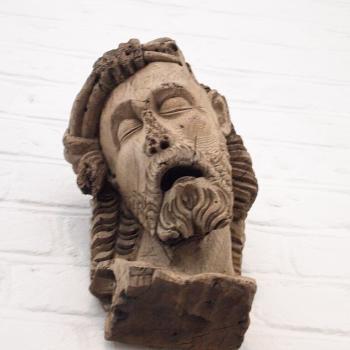
Jesus was often asked questions by people who were not looking for him to give them answers which they could use to learn from and use to transform their lives. Instead, they wanted him to give answers which they believed they could use to criticize Jesus and ruin his reputation. They knew his presence challenged the way things were; people in positions of power and authority felt threatened by Jesus. They came asking him questions, hoping that, if they trapped him with a difficult question, they could take him out, eliminating the threat which he represented to the way things were. Thus, a lawyer came to test Jesus:
And one of them, a lawyer, asked him a question, to test him. “Teacher, which is the great commandment in the law?” And he said to him, “You shall love the Lord your God with all your heart, and with all your soul, and with all your mind. This is the great and first commandment. And a second is like it, You shall love your neighbor as yourself. On these two commandments depend all the law and the prophets” (Matt. 22:35-40 RSV).
St. Jerome understood what the lawyer was trying to do. The lawyer knew there were many commandments in the law. Different people could and would suggest different commandments as being the greatest. Whatever Jesus answered, the lawyer believed, would be approved by some, but would also be rejected by others who would then denounce Jesus. This would create strife, diminishing Jesus’ appeal to the people:
He is not asking about the commandments, but that which is the first and the great commandment. Thus, since everything that God commands is great, whatever Jesus might respond would create a pretext for bringing a malicious charge. For Jesus would be asserting that one was great out of very many. Therefore, whoever knows and asks a question, not with the wish to learn, but out of a zeal to find out whether the one who is to respond knows, he approaches not as a learner but as a tempter, in imitation of the Pharisees. [1]
Jesus answered the question in a way which got him out of the trap. He did this by pointing out that all the commandments should be seen as integrated together. Love for God and love for our neighbor, together, serve as the foundation for the rest of the law. Thus, he answered by saying the whole of the law was important.
People can ask questions for many different reasons. Some of them are given by people who truly want to learn, and respect should be shown to those questions which are given by honest inquirers. But many questions are not so innocent. As Jerome indicates, if someone asks a question with a desired answer, that is, if they think they know the answer, they are not asking to learn, but to teach or test those whom they question. Sometimes, this is good, if the person who is giving questions is an educator who is trying to discern how well their students are leaning. However, often, as in the case with this lawyer, such questions are not used for some pedagogical tool, but rather, they serve as the foundation for an attack. When such people are confronted for their actions, they try to act naïve and say, “I’m just asking questions. What’s wrong with that?” As Jerome answers, people who ask questions in bad faith are not trying to learn anything by asking their questions, and so there can be and often is much harm intended by their bad intentions. Leading questions, especially if they are based upon false premises, or false dichotomies, serve propaganda, not truth.
Jesus, in his answer, was able to get beyond the trap set up for him, but not all of us are able to do so. We must be careful when engaging others. If we are not capable of finding an answer which gets us out of such a trap, we must then figure out the right thing to do. At times, it might be best for us to call out the person and point out the bad intentions behind their question, and at other times, it might be best to be silent and not answer them in any fashion. What is important is for us to realize our limitations and not get stuck in such a trap. This is especially important for us as Christians, because we are called to share Christ with the world, to reveal to it the transcendent glory of God, and that is difficult if we get sidetracked by dealing with such traps. We have treasure which we want to share, and so we should share it with those who are willing to listen to us, instead of those who just want to come and fight:
For it is the God who said, “Let light shine out of darkness,” who has shone in our hearts to give the light of the knowledge of the glory of God in the face of Christ. But we have this treasure in earthen vessels, to show that the transcendent power belongs to God and not to us (2 Cor. 4:6-7 RSV).
The glory of God, the light which shines in the darkness, transcends us and yet comes to us and is found in us and shines through us. The transcendent remains transcendent even as it is immanent in us. We are earthen vessels who receive that light, a light we must let shine out in the world and into the darkness of sin. In this way, we will dispel sin, allowing others to be illuminated by that transcendent light. We are to engage God’s justice on earth, seeking God’s will be done on earth as it is in heaven. Where there is injustice, we must seek justice, letting the sun of righteousness reign. When we act, when we follow the mission of the light, we will be confronted by the darkness, by those trying to keep things as they are. Like the lawyer, such people will try to find ways to undermine our work for justice. We must not let them divert us with useless questions. We must continue to promote the kingdom of God and all its righteousness, and with it, confront the powers that be with the light of justice. There will be contention. Many of us will suffer as we seek to transform the world; but as Paul, who experienced such contention in his day said, we must not despair:
We are afflicted in every way, but not crushed; perplexed, but not driven to despair; persecuted, but not forsaken; struck down, but not destroyed; always carrying in the body the death of Jesus, so that the life of Jesus may also be manifested in our bodies (2 Cor. 4:8-10 RSV).
We are united to Christ. We experience the grace of Christ in us, in our very bodies, so that in and through them we are called to work in the world, to bring the light of Christ to it. That is, we are to continue the eschatological work of Christ in the world. The eschaton has been immanentized in Christ, and we, in history, continue his eschatological work. We are to take the justice of the kingdom of God and spread it throughout the world, overcoming all systematic structures of sin. When there is injustice, we must embrace the transcendent grace in our life and use it in our fight against it. The powers that be will fight back, questioning us and our motives. They will project their own sin upon us, trying to recreate the structures of sin through such projection, but we must not allow it. When racism is fought, racists will claim it is racism to fight racism: such absurdity is always found when we examine the defense given to sin, for sin is irrational and absurd. We must not allow that insanity to touch us; we must not be led into temptation and engage those questions which will divert us from doing the work which we are called to do. We must act; we must live out the righteousness of God, spreading it throughout the world. And even if things look difficult, even if it seems sin is winning, we must not despair, for no matter how much the darkness fights back against the light, the darkness never will win. As the resurrection shows us, after the light seems to be extinguished, it comes back, brighter, more powerful than before.
[1] St. Jerome, Commentary on Matthew. Trans. Thomas P. Scheck (Washington. DC: CUA Press, 2008), 256.
Stay in touch! Like A Little Bit of Nothing on Facebook.
If you liked what you read, please consider sharing it with your friends and family!













